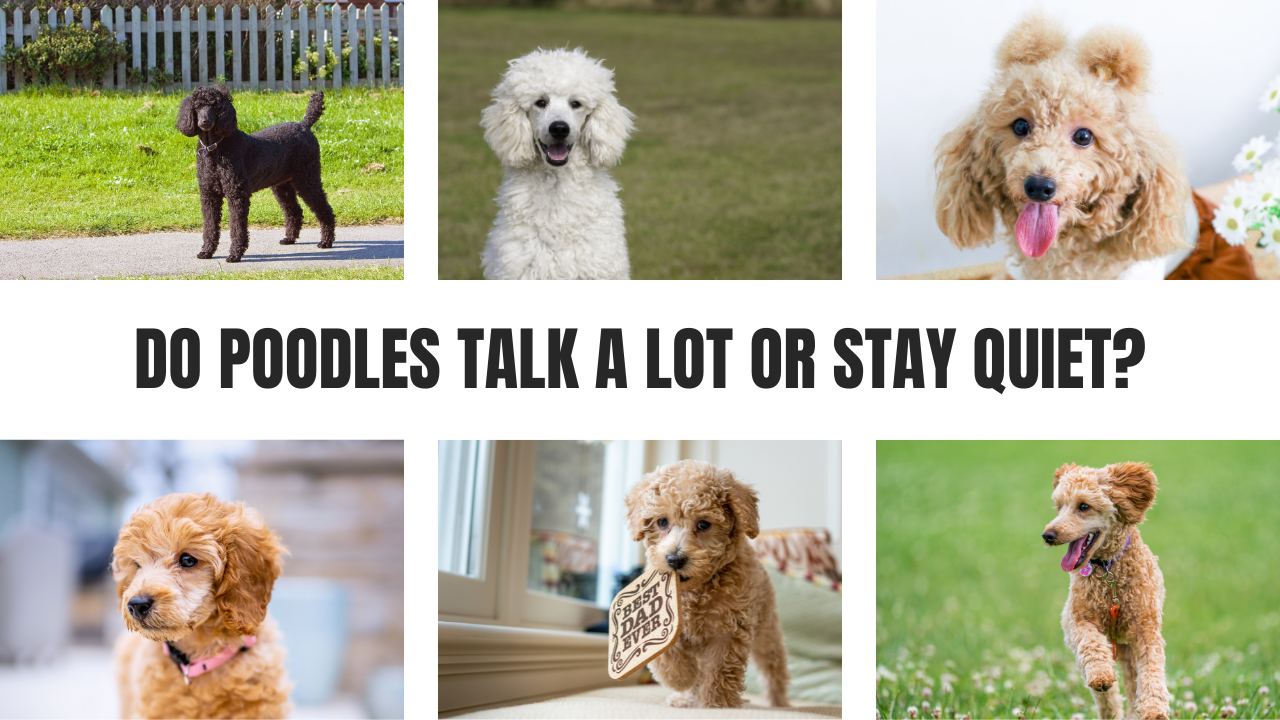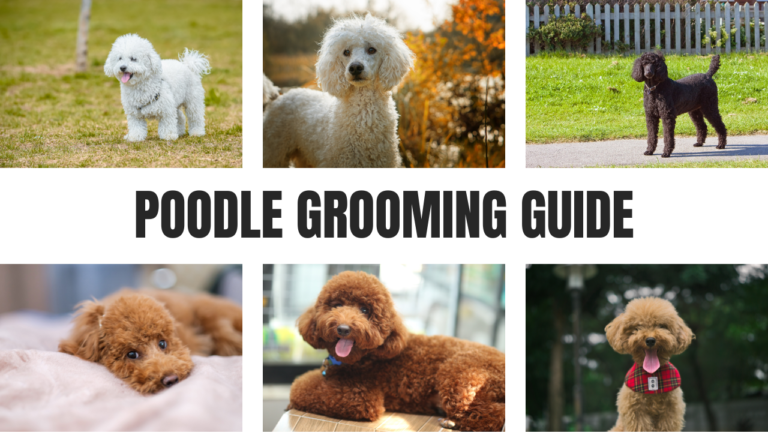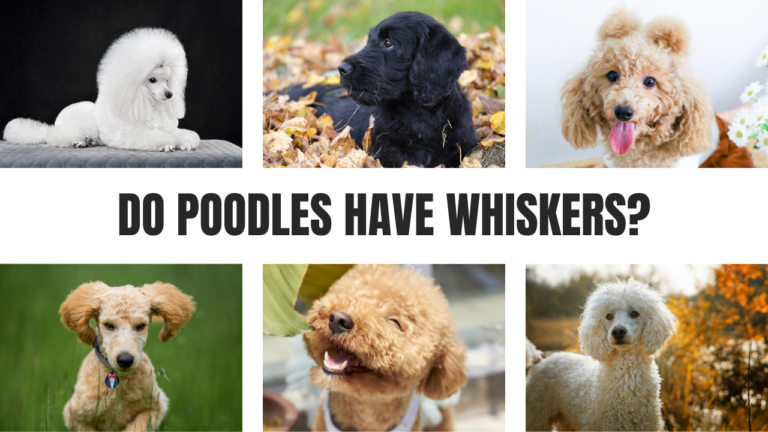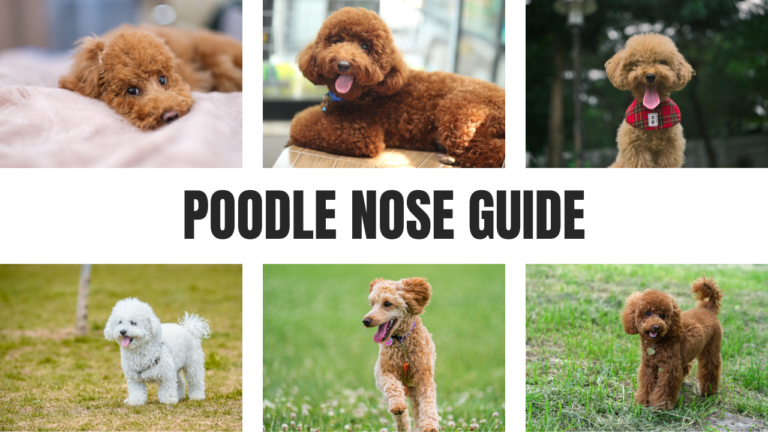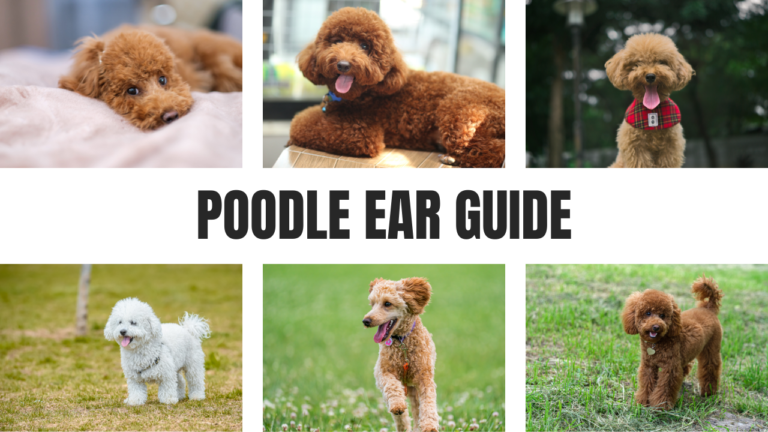Discover – Do Poodles Talk A Lot or Stay Quiet?
Poodles are one of the most intelligent dog breeds, known for their trainability, elegant appearance, and charming personalities.
However, many potential dog owners are often curious about how much Poodles “talk” or vocalize.
While some breeds are more vocal than others, it’s important to understand how a Poodle’s communication style works and how it compares to other dogs.
In this article, we will explore the factors that contribute to a Poodle’s vocalization habits, whether Poodles talk a lot, and how you can manage their behavior if they become excessively vocal.
Understanding Poodle Communication
Before we dive into how much Poodles “talk,” it’s essential to understand how dogs, including Poodles, communicate in general.
Dogs are not known for speaking in human language, but they have a wide range of ways to express themselves.
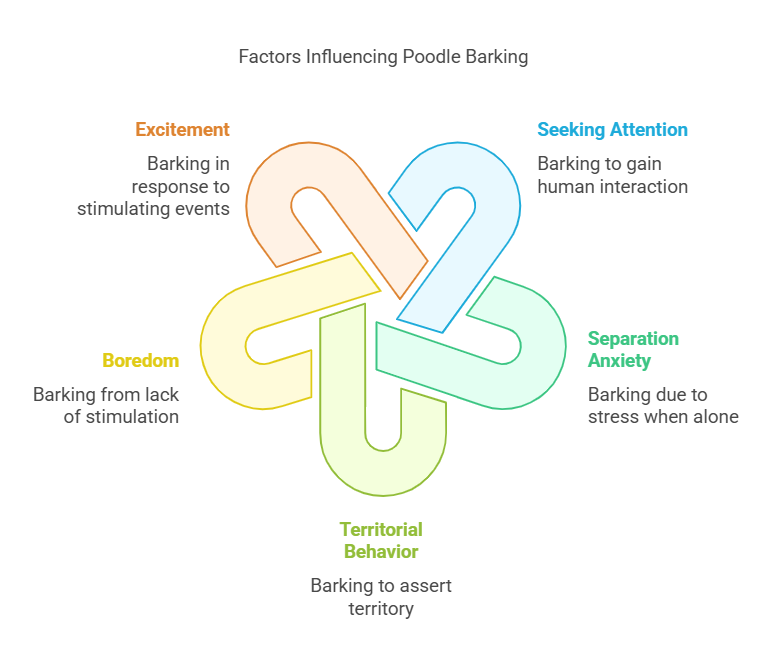
These include body language, facial expressions, barking, whining, growling, and even howling.
Poodles, with their keen intelligence, are particularly adept at using different forms of vocalization and non-vocal cues to communicate.
Vocalizations: What Do They Mean?
Poodles can be quite expressive when it comes to vocalizing. Their primary vocal sounds include barking, whining, growling, howling, and yipping or yelping.
Barking is the most common vocalization for dogs, and Poodles will bark to alert you to something happening, express excitement, or seek attention.
Whining typically indicates a need or desire, such as being hungry, needing to go outside, or seeking companionship.

A growl can signal discomfort, a warning, or frustration. However, it can also be a playful sound if made in a non-threatening context.
Howling is less common but can be triggered by sirens or other sounds.
Yipping or yelping are usually high-pitched sounds that express excitement or pain and are used to grab attention or communicate urgency.
The frequency and type of vocalizations vary from dog to dog. Some Poodles are more talkative, while others are relatively quiet.
Let’s look into the factors that influence a Poodle’s tendency to vocalize.
Read More = Can Poodle Get Fleas
Why Do Poodles Bark So Much?
Poodles are incredibly social and intelligent dogs, and they thrive on human interaction. One reason your Poodle might bark excessively is to get your attention.
Poodles are highly attuned to their owners’ behaviors and will often bark when they want to play, receive affection, or request food.
According to the American Kennel Club (AKC), Poodles are known for their need for stimulation and affection, and this may drive them to vocalize to get their owner’s attention.
Separation anxiety is another reason why Poodles might bark excessively. Like many companion breeds, Poodles form deep bonds with their owners, and they may become anxious when left alone.
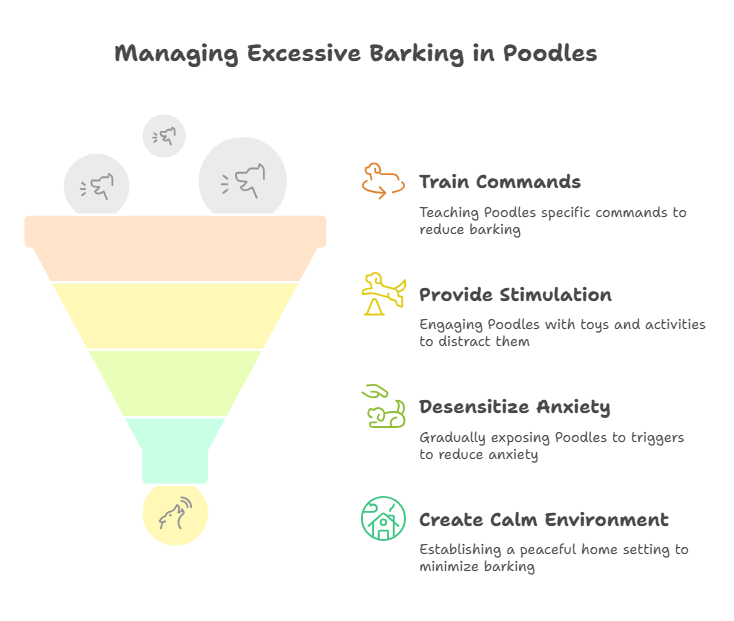
A study published in Frontiers in Veterinary Science found that dogs with separation anxiety are more likely to engage in vocalization, including barking and whining.
Poodles, particularly Toy and Miniature varieties, are known to experience separation anxiety, which can lead to persistent barking when their owners are absent.
Poodles can also be territorial, which is why they may bark when they sense someone approaching their home or when they encounter unfamiliar animals.
The act of barking serves as a warning to potential intruders. This behavior is common in breeds that are protective of their environment.
According to research in Applied Animal Behaviour Science, more territorial dogs are likely to exhibit more vocalization, especially in response to perceived threats.

Poodles are highly intelligent dogs, and if they are not mentally stimulated, they can resort to excessive barking as a means of coping with boredom.
A 2020 study in Animal Cognition revealed that dogs who are under-stimulated or not given enough opportunities for physical and mental exercise may increase their vocalizations to fill the gap.
This behavior can manifest as barking, which is often used to seek attention or express frustration.
Poodles are known to be excitable, especially in certain environments. When they are excited, they might bark loudly, which is often mistaken for excessive talking.
This is particularly common when a Poodle anticipates a fun activity, like a walk or playtime, or when they meet new people.
In these situations, barking is a way for Poodles to express their joy and enthusiasm.
Do Poodles Bark Less Than Other Breeds?
While some breeds are known for constant vocalization, Poodles tend to be less talkative than many other small dog breeds.
For example, Chihuahuas, Pomeranians, and Dachshunds are often more vocal, barking more frequently than Poodles.
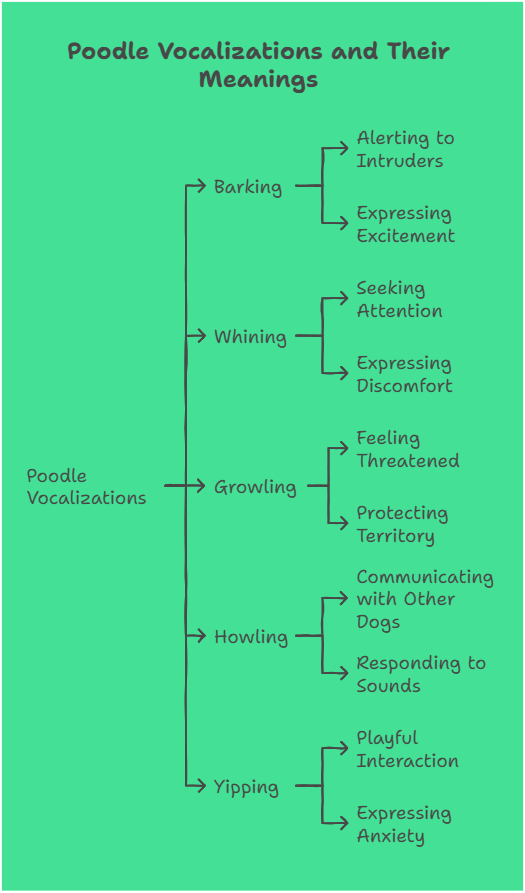
According to the American Kennel Club, Standard Poodles are generally quieter compared to smaller Poodle varieties (Toy and Miniature), which tend to bark more due to their higher energy levels.
However, this doesn’t mean that the poodles are completely silent. Standard Poodles may bark less, but they still communicate through other means like body language, growling, and whining.
The key takeaway is that while Poodles are generally quieter than other small breeds, individual temperament plays a significant role in their vocalization habits.
Read More = Poodle Growth Guide
Factors That Influence Poodle Vocalization
Poodle vocalizations are influenced by various factors, such as:
1. Breed Variety
- Standard Poodles: These larger Poodles are generally calmer and less vocal compared to Toy and Miniature Poodles. They were originally bred for retrieving and waterfowl hunting, so their temperament tends to be more reserved.
- Miniature and Toy Poodles: These smaller varieties tend to be more energetic and vocal. Their high energy and sensitivity make them more likely to bark, especially in response to stimuli or when they feel neglected.
2. Training and Socialization
Early socialization and training can have a significant impact on the level of vocalization in Poodles.
Dogs that are not properly socialized may bark excessively due to fear or anxiety in new situations.
Proper socialization can help Poodles learn to feel more comfortable in different environments, reducing their need to bark as a coping mechanism.
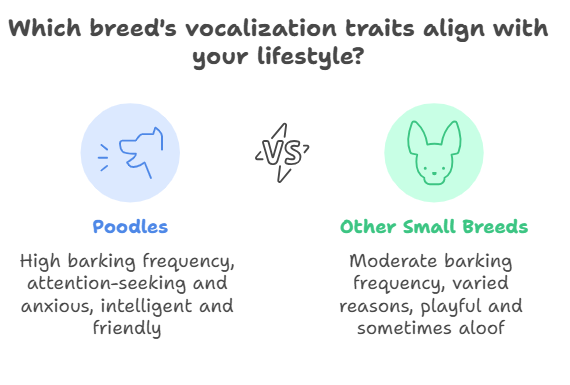
3. Health and Age
Older Poodles or those suffering from health issues might bark more due to pain or discomfort.
For instance, joint problems or dental issues can cause discomfort that may lead to increased vocalization.
In older dogs, hearing loss might also make them more vocal as they become disoriented or anxious.
How to Manage Excessive Barking in Poodles?
Training your Poodle to respond to specific commands, such as “quiet” or “enough,” can help control excessive barking.
Consistency is key — reward your Poodle with praise or treats when they stop barking on command.
This helps your dog learn when it is appropriate to vocalize and when silence is expected.
Poodles are intelligent and active dogs, so they need plenty of mental and physical exercise.
Engage them with puzzle toys, training exercises, and daily walks. Keeping your Poodle busy and challenged reduces boredom, which is a common cause of excessive barking.
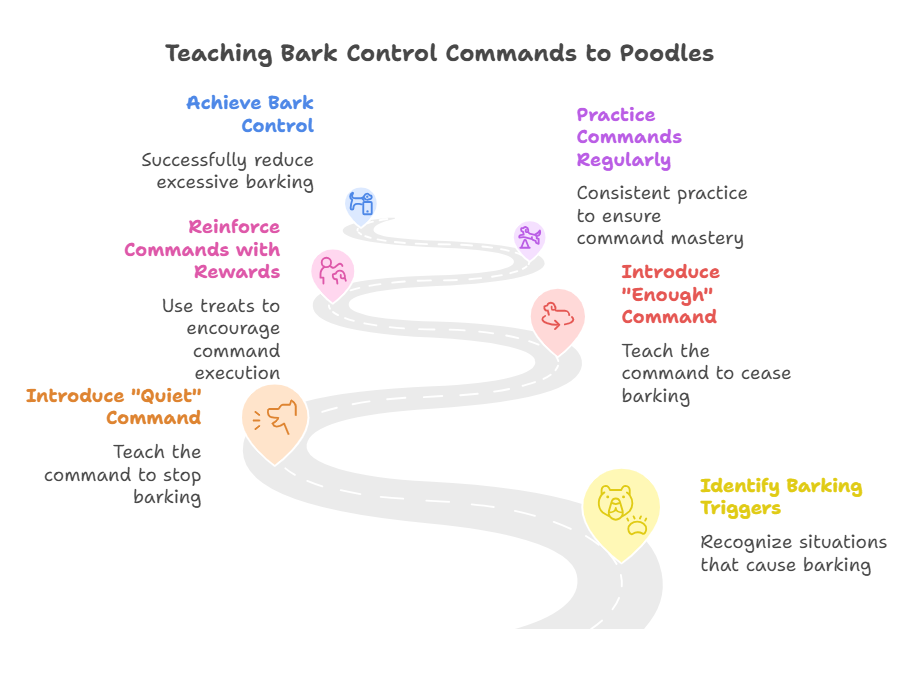
If your Poodle barks due to separation anxiety, desensitize them gradually. Start by leaving them alone for short periods, then increase the time gradually.
Use distraction toys or calming aids, such as pheromone diffusers, to help make them more comfortable while you are away, reducing anxiety-driven barking.
Proper socialization is also crucial in reducing excessive barking. Expose your Poodle to new experiences, people, and environments at a young age.
This helps them build confidence and reduces their reactive behavior to new stimuli, leading to quieter and more composed behavior.
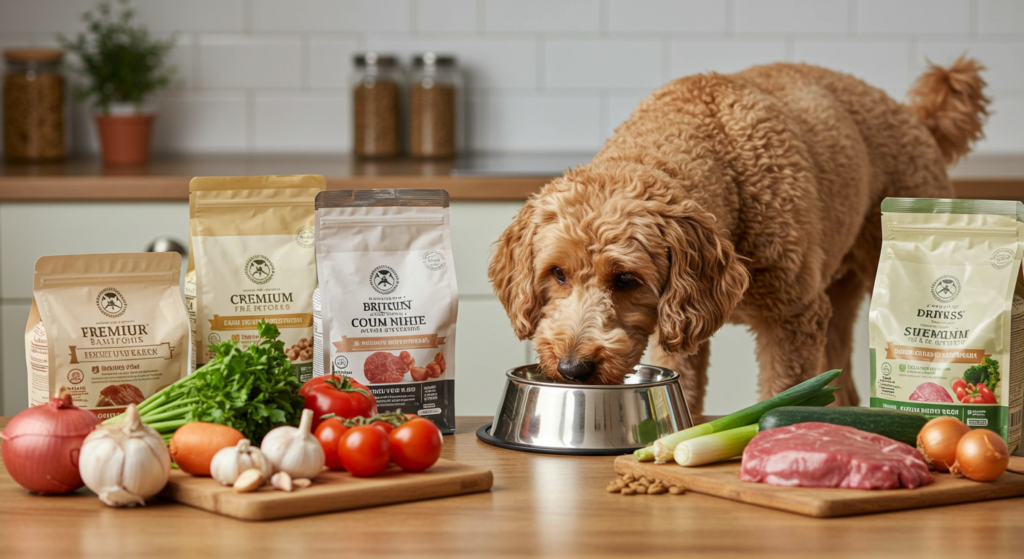
To minimize barking caused by external triggers, consider creating a calm environment inside your home.
Playing soothing music or using white noise can help mask sounds that might cause your Poodle to bark, such as outside noises or other animals.
This provides a more peaceful environment, discouraging unnecessary vocalization.
Read More = Poodle Nose Guide
Conclusion
Poodles are relatively vocal compared to some breeds but tend to bark less frequently than smaller, more excitable breeds.
Their intelligence, social nature, and sensitivity to their environment contribute to their vocalization habits.
Understanding the reasons behind your Poodle’s barking and taking proactive steps to address the underlying causes can help you manage their behavior effectively.
With proper training, socialization, mental stimulation, and a calm environment, you can reduce excessive barking and ensure that your Poodle is a happy, well-behaved companion.
Ultimately, while Poodles may talk a lot in certain situations, they are just as capable of being quiet and content with the right care and attention.

